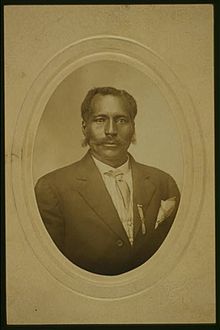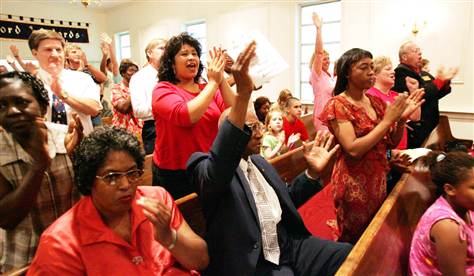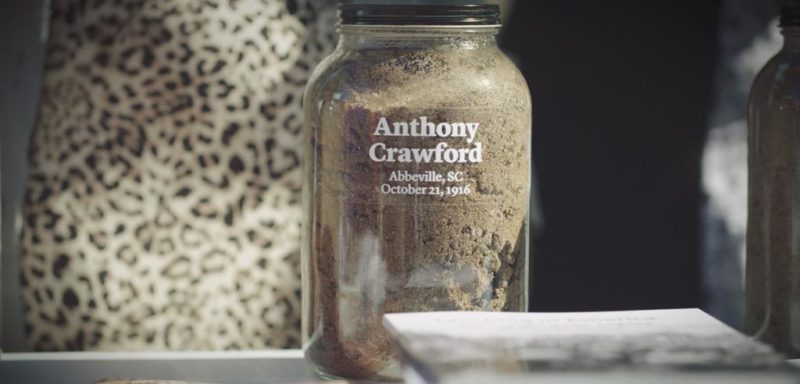Anthony Crawford: Father, Husband, Wealthy Landowner, Farmer
Share
Explore Our Galleries
Newest Exhibit
Breaking News!
Today's news and culture by Black and other reporters in the Black and mainstream media.
Ways to Support ABHM?
Murdered in: Abbeville | Oct 21, 1916
SCHOLAR-GRIOT: Doria Dee Johnson, 2011
Doria Johnson, great-great granddaughter of Anthony Crawford, recounts his lynching and the effect it had on the lives of his descendants
My great-great grandfather Anthony P. Crawford was born in January, 1865 and owned by Ben and Rebecca Crawford in Abbeville, South Carolina.

Anthony Crawford was lynched for disputing the price for his crop with a white buyer. His entire family was then run out of town.
He walked 14 miles roundtrip to and from school each day and proved to be quite a scholar. When Anthony finished school he was a laborer for Ben Crawford until Thomas Crawford, Anthony's father, died in 1893 and deeded some land to Anthony, who was the only one of nine siblings able to sign his own name.
Anthony Crawford was lynched in 1916 in Abbeville, SC by a crowd estimated to be between 200 and 400 blood-thirsty white people. His crime you might ask? Cursing a white man for offering him a low price for the cotton seed he was trying to sell and being too rich for a Negro.
His ordeal lasted all day. His body was beaten and dragged through town to show other Negroes what would happen to them if they got "insolent." Finally, he was taken to the county fair grounds and strung up to a tree and riddled with bullets. Although we have heard his body was thrown on someone's lawn, we have yet to locate his grave.
The family was ordered to vacate their land, wind up business and get out of town. They did just that.
My great-great grandfather stated early in life, "The day a white man hits me is the day I die." And he did. But he left an example of hard work and determination.
He still lives in all of us. Many of us still attend AME Churches and we have been told that we have "that arrogant Crawford way." But we know that those murderers were NOT successful in breaking up the Crawfords. We still stand today proud and close and live our lives as he would've wanted us to. We will not stop looking for each other until the last Crawford is accounted for, and we can stand on his land and look toward heaven and pray that he knows we are together again.
People Gather to Settle Pain
About nine decades after a lynching, white preachers apologize to the victim's relatives for the crime that was kept silent for generations.
By Ellen Barry, Los Angeles Times, July 13, 2005

Engene Crawford, center, grandson of lynching victim Anthony Crawford, and his family react during a reconciliation service at Friendship Worship Center Tuesday in Abbeville, S.C. (Mary Ann Chastain / AP)
ABBEVILLE, S.C. — By car, by foot, by Greyhound bus, the descendants of a black farmer named Anthony Crawford came back here Tuesday to accept an apology for his lynching.
They gathered in an unadorned yellow-brick church in the city that proudly claimed it was "the birthplace and the deathbed of the Confederacy." They waved trembling hands as a series of white preachers asked forgiveness for the slaying that took place 89 years ago in the town's Court Square.
For a more complete report of the reconciliation service, click here.
Hundreds Dedicate Lynching Marker to Anthony Crawford in Abbeville, South Carolina
Equal Justice Initiative (EJI) – October 24, 2016
This weekend, community members, college students, and supporters from near and far gathered in Abbeville, South Carolina, to commemorate and reflect upon the 100th anniversary of a tragic event: the lynching of Anthony P. Crawford.
On Friday, hundreds gathered in Abbeville’s Jefferson Davis Park for a Freedom School, during which students from Kenyon College and Clemson University, activists, and leaders led discussions about our country's history of racial injustice and its contemporary legacies. Those present included more than 100 of Anthony Crawford's descendants, who wore black armbands and buttons in his memory, as well as members of the families of Emmett Till, Ida B. Wells, and Malcolm X, who came to lend support and words of encouragement.
 The day’s events culminated with a ceremony during which family members collected soil from the site where Mr. Crawford was lynched, and a consecration service in the Abbeville town square led by the Samuel DeWitt Proctor Conference in anticipation of the unveiling of a historical marker commemorating the lynching. The soil collection for Mr. Crawford was part of EJI’s Community Remembrance Project, a campaign to recognize the victims of lynching by collecting soil from lynching sites and creating a memorial that acknowledges the horrors of racial injustice in America.
The day’s events culminated with a ceremony during which family members collected soil from the site where Mr. Crawford was lynched, and a consecration service in the Abbeville town square led by the Samuel DeWitt Proctor Conference in anticipation of the unveiling of a historical marker commemorating the lynching. The soil collection for Mr. Crawford was part of EJI’s Community Remembrance Project, a campaign to recognize the victims of lynching by collecting soil from lynching sites and creating a memorial that acknowledges the horrors of racial injustice in America.
A century ago, a white mob beat, stabbed, shot, and hung Mr. Crawford, a 56-year-old black farmer, in the Abbeville town square, after he dared to argue with a white merchant over the price of cottonseed. The patriarch of a large, multi-generational family, and the owner of 427 acres of land, Mr. Crawford was a successful farmer and leader whose murder had long-reaching effects.
The gruesome public murder, though committed openly, did not lead to prosecution or conviction for any members of the mob. Days after the lynching, Abbeville’s white residents “voted” to expel the Crawford family from the area and seize their property. When South Carolina's governor declared himself powerless to protect the family from violence, most of the surviving relatives fled to destinations as distant as New York and Illinois, fragmenting the once strong and close-knit family.
Video of the 2016 ceremony dedicating the historical marker:
It would take ongoing efforts over generations to begin to repair and reconnect those bonds through family reunions and the persistence of family elders who ensured that the younger generations saw Grandpa Crawford’s photograph at family gatherings and knew the story of both his life and death. This weekend, descendants of Anthony Crawford from as far as California, Washington, D.C., Illinois, Texas, and New York – as well as some who remain in Abbeville today – gathered for a powerful commemoration event....
EJI is honored to partner with the descendants of Anthony Crawford to sponsor the historical marker and essay contest for high school students in Abbeville as part of our Lynching Marker Project. EJI continues to seek opportunities to work with communities where lynchings occurred to raise public awareness and erect historical markers.
Read the full article here.
Comments Are Welcome
Note: We moderate submissions in order to create a space for meaningful dialogue, a space where museum visitors – adults and youth –– can exchange informed, thoughtful, and relevant comments that add value to our exhibits.
Racial slurs, personal attacks, obscenity, profanity, and SHOUTING do not meet the above standard. Such comments are posted in the exhibit Hateful Speech. Commercial promotions, impersonations, and incoherent comments likewise fail to meet our goals, so will not be posted. Submissions longer than 120 words will be shortened.
See our full Comments Policy here.









[…] How do you measure the lack of an Anthony Crawford, lynched as a result of he was an uppity Negro? How do you measure who Mrs. Mary Turner might need […]
[…] Dee Johnson wrote one of many first profiles on her great-great grandfather Anthony P. Crawford. The South Carolina farmer completed college and was a laborer. He was the one one among 9 siblings […]
[…] Dee Johnson wrote one of the first profiles on her great-great grandfather Anthony P. Crawford. The South Carolina farmer finished school and was a laborer. He was the only one of nine siblings […]